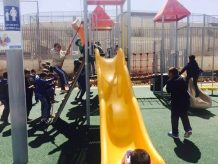Playgrounds alongside Community Gardens In the Palestinian Neighborhoods of East Jerusalem

In the Palestinian neighborhoods of East Jerusalem, there is a severe shortage of public parks, as well as other public infrastructure and services. The Israeli authorities have built under 20 playgrounds in these neighborhoods, even though they are home to some 400,000 Palestinians (39% of the city’s population according to municipal data from the end of 2012). In comparison, in the Israeli neighborhoods there are hundreds of playgrounds. The absence of public spaces has an extremely negative impact on proper daily life, especially for children – many of whom resort to playing in the streets. Furthermore, the few playgrounds that do exist deteriorate quickly for lack of maintenance and other reasons, to the point that they become hazardous. Clearly, neither playing in the streets nor having to leave the neighborhood for a breath of fresh air, are acceptable solutions.
To address this problem, Bimkom’s East Jerusalem department has been working, among other things, to increase the number of playgrounds in the Palestinian neighborhoods of East Jerusalem. The main goal is to strengthen local initiatives such as community gardens. This is imperative, because it is clear that when the community is involved the deterioration of the park is significantly less likely. The sites are carefully chosen based on fieldwork and are crosschecked with Bimkom’s previous planning surveys; the planning is done with community involvement from the earliest stages. Bimkom is involved at every step along the way, serving as initiator as well as coordinator and mediator between all involved parties, including the municipality – whose permission and cooperation are essential.
Under this project, since 2016, three new playgrounds have opened – first in Sur Baher, then in Wadi aj-Joz and in Ras al-Aamoud. We are in the process of choosing sites for the next two playgrounds.
In the Palestinian neighborhoods of East Jerusalem, there is a severe shortage of public parks, as well as other public infrastructure and services. The Israeli authorities have built under 20 playgrounds in these neighborhoods, even though they are home to some 400,000 Palestinians (39% of the city’s population according to municipal data from the end of 2012). In comparison, in the Israeli neighborhoods there are hundreds of playgrounds. The absence of public spaces has an extremely negative impact on proper daily life, especially for children – many of whom resort to playing in the streets. Furthermore, the few playgrounds that do exist deteriorate quickly for lack of maintenance and other reasons, to the point that they become hazardous. Clearly, neither playing in the streets nor having to leave the neighborhood for a breath of fresh air, are acceptable solutions.
To address this problem, Bimkom’s East Jerusalem department has been working, among other things, to increase the number of playgrounds in the Palestinian neighborhoods of East Jerusalem. The main goal is to strengthen local initiatives such as community gardens. This is imperative, because it is clear that when the community is involved the deterioration of the park is significantly less likely. The sites are carefully chosen based on fieldwork and are crosschecked with Bimkom’s previous planning surveys; the planning is done with community involvement from the earliest stages. Bimkom is involved at every step along the way, serving as initiator as well as coordinator and mediator between all involved parties, including the municipality – whose permission and cooperation are essential.
Under this project, since 2016, three new playgrounds have opened – first in Sur Baher, then in Wadi aj-Joz and in Ras al-Aamoud. We are in the process of choosing sites for the next two playgrounds.
